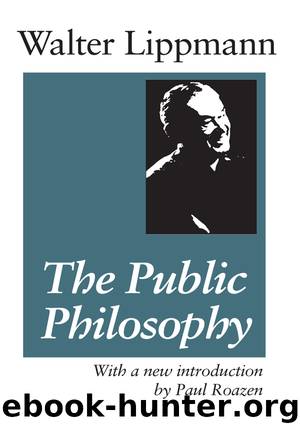The Public Philosophy by Hans Eysenck

Author:Hans Eysenck [Eysenck, Hans]
Language: eng
Format: epub
Tags: Political Science, General, History & Theory
ISBN: 9781351475877
Google: 6m5QDwAAQBAJ
Publisher: Routledge
Published: 2017-09-29T12:58:34+00:00
2. The Great Vacuum
TO SPEAK of a public philosophy is, I am well aware, to raise dangerous questions, rather like opening Pandoraâs box.
Within the Western nations, as Father Murray has put it, there is âa plurality of incompatible faithsâ;5 there is also a multitude of secularized and agnostic people. Since there is so little prospect of agreement, and such certainty of dissension, on the content of the public philosophy, it seems expedient not to raise the issues by talking about them. It is easier to follow the rule that each personâs beliefs are private and that only overt conduct is a public matter.
One might say that this prudent rule reflects and registers the terms of settlement of the religious wars and of the long struggle against exclusive authority in the realm of the spirit by âthrones or dominations, or principalities or powers.â
Freedom of religion and of thought and of speech were achieved by denying both to the state and to the established church a sovereign monopoly in the field of religion, philosophy, morals, science, learning, opinion and conscience. The liberal constitutions, with their bills of rights, fixed the boundaries past which the sovereign â the King, the Parliament, the Congress, the voters â were forbidden to go.
Yet the men of the seventeenth and eighteenth centuries who established these great salutory rules would certainly have denied that a community could do without a general public philosophy. They were themselves the adherents of a public philosophy â of the doctrine of natural law, which held that there was law âabove the ruler and the sovereign peopleâ¦above the whole community of mortals.â 6
The traditions of civility spring from this principle, which was first worked out by the Stoics. As Ernest Barker says:
The rational faculty of man was conceived as producing a common conception of law and order which possessed a universal validityâ¦. This common conception included, as its three great notes, the three values of Liberty, Equality and the brotherhood or Fraternity of all mankind. This common conception, and its three great notes, have formed a European set of ideas for over two thousand years. It was a set of ideas which lived and moved in the Middle Ages; and St. Thomas Aquinas cherished the idea of a sovereign law of nature imprinted in the heart and nature of man, to which kings and legislators must everywhere bow. It was a set of ideas which lived and acted with an even greater animation from the days of the Reformation to those of the French Revolutionâ¦Spoken through the mouth of Locke, [they had justified] the English Revolution of 1688, and had recently served to inspire the American Revolution of 1776â¦They were ideas of the proper conduct of states and governments in the area of internal affairs. They were ideas of the natural rights of man â of liberty, political and civic, with sovereignty residing essentially in the nation, and with free communication of thoughts and opinions; of equality before the law, and the equal
Download
This site does not store any files on its server. We only index and link to content provided by other sites. Please contact the content providers to delete copyright contents if any and email us, we'll remove relevant links or contents immediately.
| Anarchism | Communism & Socialism |
| Conservatism & Liberalism | Democracy |
| Fascism | Libertarianism |
| Nationalism | Radicalism |
| Utopian |
The Secret History by Donna Tartt(19085)
The Social Justice Warrior Handbook by Lisa De Pasquale(12190)
Thirteen Reasons Why by Jay Asher(8909)
This Is How You Lose Her by Junot Diaz(6885)
Weapons of Math Destruction by Cathy O'Neil(6279)
Zero to One by Peter Thiel(5801)
Beartown by Fredrik Backman(5751)
The Myth of the Strong Leader by Archie Brown(5507)
The Fire Next Time by James Baldwin(5442)
How Democracies Die by Steven Levitsky & Daniel Ziblatt(5218)
Promise Me, Dad by Joe Biden(5153)
Stone's Rules by Roger Stone(5087)
A Higher Loyalty: Truth, Lies, and Leadership by James Comey(4960)
100 Deadly Skills by Clint Emerson(4924)
Rise and Kill First by Ronen Bergman(4788)
Secrecy World by Jake Bernstein(4752)
The David Icke Guide to the Global Conspiracy (and how to end it) by David Icke(4717)
The Farm by Tom Rob Smith(4507)
The Doomsday Machine by Daniel Ellsberg(4490)
